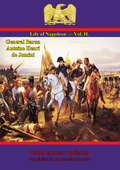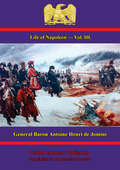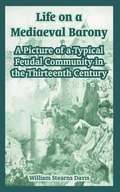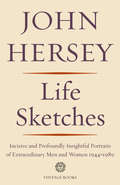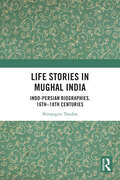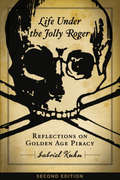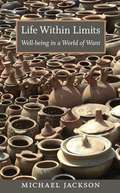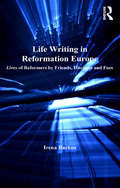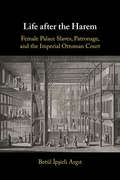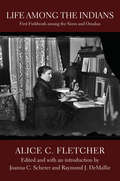- Table View
- List View
Life Of Napoleon — Vol. II. (Life Of Napoleon #2)
by General Baron Antoine Henri de Jomini General H. W. HalleckThe life of Napoleon is etched still across the history of Europe, in the wars he waged, the dynasties that he toppled, and the laws he enacted. Even in an epoch rich in social change, from the bottom up he remains a fascinating figure; biographers face the challenge of doing justice to such a multi-faceted character. Few can have been said to have access to the Emperor as much as the generals that served under him throughout his many campaigns; General Jomini spent many year serving the Emperor and many more in the company of some of his enemies putting him in an excellent position to write his biography. Written as if by Napoleon himself, Jomini traces Napoleon's political and military successes and failures, weaving them into a seamless narrative that makes his work one of the few rounded biographies of Napoleon.This second volume covers the campaigns of Austerlitz, Jena, Eylau and Friedland and the beginnings of the Peninsular War.Of the Author -- General Jomini saw much service during the Napoleonic Wars, initially working in staff positions for Marshal Ney prior to being attached to the Emperor's own headquarters during the 1806 and 1807 campaigns. He was pushed out of the Grande Armée into the arms of the Russian service in 1813, becoming aide-de-camp to the Tzar. He was famous for his copious output of works on the military theory and strategy employed during the French Revolution, the Napoleonic Wars, and even those of Frederick the Great. He is often remembered for his chef d'œuvre, the "Art of War", and has been dubbed the "founder of modern strategy" by historian John Shy.Author -- General Baron Antoine Henri de Jomini (1779-1869)Translator -- General H. W. Halleck (1815-1872)
Life Of Napoleon — Vol. III. (Life Of Napoleon #3)
by General Baron Antoine Henri de Jomini General H. W. HalleckThe life of Napoleon is etched still across the history of Europe, in the wars he waged, the dynasties that he toppled, and the laws he enacted. Even in an epoch rich in social change, from the bottom up he remains a fascinating figure; biographers face the challenge of doing justice to such a multi-faceted character. Few can have been said to have access to the Emperor as much as the generals that served under him throughout his many campaigns; General Jomini spent many year serving the Emperor and many more in the company of some of his enemies putting him in an excellent position to write his biography. Written as if by Napoleon himself, Jomini traces Napoleon's political and military successes and failures, weaving them into a seamless narrative that makes his work one of the few rounded biographies of Napoleon.This third volume covers the campaigns of Wagram, the continuing Spanish Ulcer and the beginnings of the Russian campaign in 1812.Of the Author -- General Jomini saw much service during the Napoleonic Wars, initially working in staff positions for Marshal Ney prior to being attached to the Emperor's own headquarters during the 1806 and 1807 campaigns. He was pushed out of the Grande Armée into the arms of the Russian service in 1813, becoming aide-de-camp to the Tzar. He was famous for his copious output of works on the military theory and strategy employed during the French Revolution, the Napoleonic Wars, and even those of Frederick the Great. He is often remembered for his chef d'œuvre, the "Art of War", and has been dubbed the "founder of modern strategy" by historian John Shy.Author -- General Baron Antoine Henri de Jomini (1779-1869)Translator -- General H. W. Halleck (1815-1872)
Life Of Napoleon — Vol. IV. (Life Of Napoleon #4)
by General Baron Antoine Henri de Jomini General H. W. HalleckThe life of Napoleon is etched still across the history of Europe, in the wars he waged, the dynasties that he toppled, and the laws he enacted. Even in an epoch rich in social change, from the bottom up he remains a fascinating figure; biographers face the challenge of doing justice to such a multi-faceted character. Few can have been said to have access to the Emperor as much as the generals that served under him throughout his many campaigns; General Jomini spent many year serving the Emperor and many more in the company of some of his enemies putting him in an excellent position to write his biography. Written as if by Napoleon himself, Jomini traces Napoleon's political and military successes and failures, weaving them into a seamless narrative that makes his work one of the few rounded biographies of Napoleon.This fourth volume covers the disastrous effects of the Russian campaign, the fight in Germany of 1813, his downfall in 1814 and his final defeat at Waterloo.Of the Author -- General Jomini saw much service during the Napoleonic Wars, initially working in staff positions for Marshal Ney prior to being attached to the Emperor's own headquarters during the 1806 and 1807 campaigns. He was pushed out of the Grande Armée into the arms of the Russian service in 1813, becoming aide-de-camp to the Tzar. He was famous for his copious output of works on the military theory and strategy employed during the French Revolution, the Napoleonic Wars, and even those of Frederick the Great. He is often remembered for his chef d'œuvre, the "Art of War", and has been dubbed the "founder of modern strategy" by historian John Shy.Author -- General Baron Antoine Henri de Jomini (1779-1869)Translator -- General H. W. Halleck (1815-1872)
Life On A Mediaeval Barony: A Picture Of A Typical Feudal Community In The Thirteenth Century
by William Stearns DavisCONTENTS The Fief of St. Aliquis; Its History and Denizens The Castle of St. Aliquis How the Castle Wakes. Baronial Hospitality Games and Diversions. Falconry and Hunting. The Baroness's Garden The Family of the Baron. Life of the Women The Matter of Clothes. A Feudal Wedding Cookery and Mealtimes The Jongleurs and Secular Literature and Poetry The Feudal Relationship. Doing Homage Justice and Punishments The Education of a Feudal Nobleman Feudal Weapons and Horses. Dubbing a Knight The Tourney A Baronial Feud. The Siege of a Castle A Great Feudal Battle-Bouvines The Life of the Peasants Charity. Care of the Sick. Funerals Popular Religion. Pilgrimages. Superstitions. Relic Worship The Monastery of St. Aliquis: Buildings, Organization. An Ill-Ruled Abbey The Monastery of St. Aliquis: The Activities of Its Inmates. Monastic Learning The "Good Town" of Pontdebois: Aspect and Organization Industry and Trade in Pontdebois. The Great Fair The Lord Bishop. The Canons. The Parish Clergy The Cathedraland Its Builders
Life On A Plantation (Historic Communities Series)
by Bobbie KalmanBobbie Kalman's acclaimed Historic Communities Series provides a close-up view of how people lived more than two hundred years ago. Colorful photos, many taken by Bobbie Kalman herself at restored historic villages across the country, help support the fascinating information. Children will have fun learning about: -- early homes and the settler community -- what people wore and the crafts they made -- how settlers made their living -- how they spent their leisure time -- the values, customs, and traditions of the early settlers The era of the southern plantation was a time when many wealthy planters lived in grand style next door to their slaves who helped them achieve it. Life on a Plantation introduces children to the daily routine of a Plantation detailing: -- life in the Big House and in the slave quarters -- work in the cotton, rice, and tobacco fields -- customs and traditions of both black and white communities -- how the slaves helped support each other and pass along African American traditions <P><P>Lexile Measure: 920L
Life On The Ocean Wave
by Rica Erickson Pamela StathamEncounters with cannibals, convicts and pirates were just some of the highlights of eleven long journeys under sail Captain George Bayly made around the world in the early nineteenth century. The journal Captain Bayly kept of his travels is notable for the historical significance of his voyages, and the writer's eye for a good story. It contains eyewitness accounts of the transportation of male and female convicts to Australia, the voyage of British immigrants to the ill-fated settlement attempted by Thomas Peel near Perth, hostilities between Maoris and Europeans, and trading voyages to and from China. Captain Bayly's stories of typhoons, floods, heroic rescues, shipboard quarrels and deaths give the book appeal to a wide audience. The journal's depiction of the infant Australian settlements as just part of a widely-flung network of British colonial outposts in the nineteenth century also provide an insight into the nation's economic development.
Life Sciences and Related Fields
by International Union of Biochemistry Molecular BiologyDuring the last decade, national and international scientific organizations have become increasingly engaged in considering how to respond to the biosecurity implications of developments in the life sciences and in assessing trends in science and technology (S&T) relevant to biological and chemical weapons nonproliferation. The latest example is an international workshop, Trends in Science and Technology Relevant to the Biological Weapons Convention, held October 31 - November 3, 2010 at the Institute of Biophysics of the Chinese Academy of Sciences in Beijing. Life Sciences and Related Fields summarizes the workshop, plenary, and breakout discussion sessions held during this convention. Given the immense diversity of current research and development, the report is only able to provide an overview of the areas of science and technology the committee believes are potentially relevant to the future of the Biological and Toxic Weapons Convention (BWC), although there is an effort to identify areas that seemed particularly ripe for further exploration and analysis. The report offers findings and conclusions organized around three fundamental and frequently cited trends in S&T that affect the scope and operation of the convention: The rapid pace of change in the life sciences and related fields; The increasing diffusion of life sciences research capacity and its applications, both internationally and beyond traditional research institutions; and The extent to which additional scientific and technical disciplines beyond biology are increasingly involved in life sciences research. The report does not make recommendations about policy options to respond to the implications of the identified trends. The choice of such responses rests with the 164 States Parties to the Convention, who must take into account multiple factors beyond the project's focus on the state of the science.
Life Sketches
by John HerseyThis collection—harvest of a lifetime of brilliant reportage and reflection—brings together the most memorable biographical pieces John Hersey has written over the past fifty years. His subjects range from Sinclair Lewis, for whom the twenty-three-year-old Hersey was secretary, and the young John F. Kennedy as he related to Hersey the dramatic story of PT 109, to Private John Daniel Ramey and his efforts to overcome illiteracy with the help of the U.S. Army, and Jessica Kelley, an elderly widow trapped in a buckling tenement as the 1955 Connecticut floods raged outside. Whether describing a brisk morning stroll with President Truman or hours spent fishing for blues with Lillian Hellman, recounting Benjamin Weintraub’s harrowing escape from a Nazi death camp or Varsell Pleas’s dangerous struggle for voting rights in the Mississippi of 1964, Hersey brings us face to face with some of the extraordinary events and people of the past half century. And it is with his profoundly curious and sympathetic mind and unsurpassed journalistic eloquence that he brings each startlingly to life. “The skill that won Hersey a Pulitzer Prize in 1945 is more than evident… an important collection of lives and their lessons.” –The New York Times Book Review “Any reader not already a fan of Hersey’s will be swayed by the richness of this collection. Hersey’s legion of admirers will merely be gratified and moved again and again…The cumulative force of these essays is amazing.” –Kirkus Reviews
Life So Far
by Betty Friedan"At last Betty Friedan herself speaks about her life and career. With the same unsparing frankness that made The Feminine Mystique one of the most influential books of our era, Friedan looks back and tells us what it took - and what it cost - to change the world." "In Life So Far, Friedan takes us on an intimate journey through her life - a lonely childhood in Peoria, Illinois, salvation at Smith College; her days as a labor reporter for a union newspaper in New York (from which she was dismissed when she became pregnant); unfulfilling and painful years as a suburban housewife; finding great joy as a mother; and writing The Feminine Mystique, which grew out of a survey of her Smith classmates and started it all." "Friedan chronicles the secret underground of women in Washington, D.C., who drafted her in the early 1960s to spearhead an "NAACP" for women, and recounts the courage of many, including some Catholic nuns who played a brave part in those early days of NOW, the National Organization for Women. She recognized early that the women's movement would falter if institutions did not change to reflect the new realities of women's lives, and she fought to keep the movement practical and free of extremism, including "man-hating." She describes candidly the movement's political infighting that brought her to the point of legal action and resulted in a long breach with fellow leaders Gloria Steinem and Bella Abzug." "In this volume, Friedan brings to extraordinary life her bold and contentious leadership in the movement. She lectures, writes, leads think tanks, and organizes women and men to work together in political, legal, and social battles on behalf of women's rights."
Life Stories
by Dorothy GallagherHere are two acclaimed memoirs in one remarkable volume. In an extraordinarily compelling voice, Dorothy Gallagher tells stories taking us from her parents' beginnings in the Ukraine to her own childhood in 1940s New York, through the many adventures of her extended family and into her own adult life. Her themes are universal: the fragility of friendship, the power of love, the marital crisis brought on by chronic illness, the role of dumb luck at the heart of life-Gallagher dramatizes her stories with acute insight, strong feeling, and edgy wit.
Life Stories in Mughal India: Indo-Persian Biographies, 16th-18th centuries
by Shivangini TandonSituated at the intersections between history and literature, the book explores the life-stories written in the Mughal period to recover socio-cultural developments in the period. It focuses on the genre of life-stories and looks at the complex interactions between agency and the ruling structure in shaping historical formations.The biographical dictionaries explored in this book highlight the significance of the agency of political actors, and the strategies through which the aristocrats and the elites reproduced the political system. At the same time, these texts are also quite helpful in recovering processes through which the ordinary people, in routine, everyday forms negotiated with and contested the political system. Delving into the life-narratives preserved in the tazkiras or biographical compendia, this book looks at the household as a political formation and positions the aristocratic households as integral to the reproduction of imperial sovereignty. The work also delves into the world of emotions and argues for the need to draw linkages between political developments and shifts in emotions and affect.This book will be an essential resource for scholars and researchers of history especially early modern history, cultural studies, literature, sociology, South Asian history. It will also be of interest to those studying gender and political discourse in early modern South Asia.
Life Stories of Women Artists, 1550-1800: An Anthology
by JuliaK. DabbsThe struggles and achievements of forty-six notable women artists of the early modern period, as documented by their contemporaries, are uniquely brought together in this anthology. The life stories presented here are foundational texts for the history of art, but since most are found only in rare volumes and few have been translated into English, until now they have been generally inaccessible to many scholars. Originally published in biographical compendia such as Vasari's Lives of the Artists, the writings included here document not only the lives of relatively well known women artists such as Artemisia Gentileschi and Sofonisba Anguissola, but also those who have languished in obscurity, like Anna Waser and Li Yin. Each life story is preceded by a brief introduction to the artist as well as to her biographer, and the texts themselves are annotated to provide necessary clarification. Beyond their documentary value, these stories provide fascinating insight as to how men commonly characterized women artists as exceptions to their sex, and attempted to explain their presence in the male-dominated realm of art. The introductory chapter to the book explores this intriguing gender dynamic and elucidates some of the strategies and historical context that factored into the composition of these lives. The volume includes an appended index to women artists' life stories in biographical compendia of the period
Life Stories: George Washington
by Gillian GosmanGeorge Washington was the Commander of the Continental Army during the American Revolution and the beloved first president of the United States. Readers will learn about the full span of Washington's life, from his childhood through his post-presidential years, in a biography that is woven with lessons on citizenship and patriotism. The book includes helpful timelines and thoughtful information about this cherished founding father.
Life Story
by Virginia Lee BurtonEarth takes center stage in this updated version of Virginia Lee Burton's 1962 classic Life Story. Told through five acts, Burton's art and text tell the history of earth from beginning to present day. Readers will gain an in-depth understanding of the planet's history and their leading roles in it today. The book has been updated with cutting-edge science, including up-to-the-minute information on fossil records and the geologic principles. We are thrilled to provide this updated artistic and visionary work in time for the anniversary of Virginia Lee Burton's 100th birthday.
Life Takes Wings: Becoming the World's First Female 747 Pilot
by Lynn Rippelmeyer&“A true story of a woman&’s drive and intensity, told with humility, grace and humor. Life Takes Wings is a great American flying story.&” —Deborah Douglas, author of American Women and Flight In Life Takes Wings, Captain Lynn Rippelmeyer soars with inspiration from a starry-eyed farm girl gazing at the sky to flight attendant to first female pilot of the revolutionary Boeing 747. More than just a story of one woman&’s love affair with the skies, Life Takes Wings combines lessons in tenacity, humility, humor, perseverance, and partnership with the exhilaration of defying social norms, and the rewards of being true to oneself. Inspired to become a commercial airline pilot in an age when it was not an option for girls, serendipitous relationships lead Lynn to her first flying lessons in a seaplane, then to becoming flight instructor and charter pilot while also working as a flight attendant. Perceived as being incapable of flying, women were relegated to the cabin. Ignoring the pilots&’ negative comments, Lynn became a number of aviation&’s female firsts—member of first all-female commercial airline crew, first flight attendant-to-pilot, and first female pilot of the Boeing 747. Through laughter and tears, Life Takes Wings shows the sky is no limit for those who follow their dreams. &“Captain Rippelmeyer&’s book is one of the best chronicles of a flying life that I have ever read. She meets turbulence with determination and fortitude, but with a positive approach and a marvelous sense of humor, which seems to be rare these days.&” —Jacqueline Boyd, PhD, chair, Amelia Earhart Memorial Scholarship Fund and 99s 2020 recipient of the Award of Achievement for Contributions to Aviation
Life Through Time: The 700-Million-Year Story of Life on Earth (DK Panorama)
by John WoodwardTravel back in time and watch the incredible story of life on Earth unfold.Life Through Time explores the origins of species that still exist today in early fish, amphibians, birds, reptiles, and mammals. It takes readers through the years of dinosaurs and megafauna up to the appearance of our first human ancestors around six million years ago, to the evolution of hunter-gathering Homo sapiens in the Ice Age and the first civilizations.Perfect for children and parents to read together and discover the incredible story of life on our planet. Open the book and let the 700-million-year journey begin!
Life Under the Jolly Roger: Reflections on Golden Age Piracy
by Gabriel KuhnOver the last couple of decades, an ideological battle has raged over the political legacy and cultural symbolism of the "golden age" pirates who roamed the seas between the Caribbean Islands and the Indian Ocean from roughly 1690 to 1725. They are depicted as romanticized villains on the one hand and as genuine social rebels on the other. Life Under the Jolly Roger examines the political and cultural significance of these nomadic outlaws by relating historical accounts to a wide range of theoretical concepts—reaching from Marshall Sahlins and Pierre Clastres to Mao Zedong and Eric J. Hobsbawm via Friedrich Nietzsche and Michel Foucault. With daring theoretical speculation and passionate, respectful inquiry, Gabriel Kuhn skillfully contextualizes and analyzes the meanings of race, gender, sexuality, and disability in golden age pirate communities, while also surveying the breathtaking array of pirates' forms of organization, economy, and ethics. Life Under the Jolly Roger also provides an extensive catalog of scholarly references for the academic reader. Yet this delightful and engaging study is written in language that is wholly accessible for a wide audience. This expanded second edition includes an appendix with interviews about contemporary piracy, the ongoing fascination with pirate imagery, and the thorny issue of colonial implications in the romanticization of pirates.
Life Was Simpler Then
by Loula Grace ErdmanIn this charming book of personal recollections, the author, Loula Grace Erdman, returns to her childhood in western Missouri and recreates the way of life as she then knew it. There is, for instance, and amusing section on the series of hired men who helped on the farm, followed by chapters on spring house cleaning, on family reunions, on church attendance, on the Chautauqua. It was a time where there was a second table for the children at dinner parties, when a helpful, omniscient Central was at the other end of the telephone wire, when harvesting ice or making apple butter was a neighborhood affair. It is only yesterday in a small American town.These lively reminiscences are touched here and there with humor and pathos and everywhere with that nostalgia which springs from the near resemblance of the author’s recollections to our own. Of Ms. Erdman’s many successful books, Life Was Simpler Then is likely to be remembered most fondly—and longest.
Life Within Limits: Well-being in a World of Want
by Michael JacksonThe sense that well-being remains elusive, transitory, and unevenly distributed is felt by the rich as well as the poor, and in all societies. To explore this condition of existential dissatisfaction, the anthropologist Michael Jackson traveled to Sierra Leone, described in a recent UN report as the "least livable" country in the world. There he revisited the village where he did his first ethnographic fieldwork in 1969-70 and lived in 1979. Jackson writes that Africans have always faced forces from without that imperil their lives and livelihoods. Though these forces have assumed different forms at different times--slave raiding, warfare, epidemic illness, colonial domination, state interference, economic exploitation, and corrupt government--they are subject to the same mix of magical and practical reactions that affluent Westerners deploy against terrorist threats, illegal immigration, market collapse, and economic recession. Both the problem of well-being and the question of what makes life worthwhile are grounded in the mystery of existential discontent--the question as to why human beings, regardless of their external circumstances, are haunted by a sense of insufficiency and loss. While philosophers have often asked the most searching questions regarding the human condition, Jackson suggests that ethnographic method offers one of the most edifying ways of actually exploring those questions.
Life Writing in Reformation Europe: Lives of Reformers by Friends, Disciples and Foes (St Andrews Studies In Reformation History Ser.)
by Irena BackusThe Reformation period witnessed an explosion in the number of biographies of contemporary religious figures being published. Whether lives of reformers worthy of emulation, or heretics deserving condemnation, the genre of biography became a key element in the confessional rivalries that raged across Europe in the sixteenth and seventeenth centuries. Offering more than a general survey of Life writing, this volume examines key issues and questions about how this trend developed among different confessions and how it helped shape lasting images of reformers, particularly Luther and Calvin up to the modern period. This is the first-ever full length study of the subject showing that Lives of the reformers constitute an integral part of the intellectual and cultural history of the period, serving as an important source of information about the different Reformations. Depending on their origin, they provide a lesson in theology but also in civic values and ideals of education of the period. Genevan Lives in particular also point up the delicate issue of 'Reformed hagiography' which their authors try to avoid with a varying degree of success. Having consistently been at the forefront of the study of the intellectual history of the Reformation Irena Backus is perfectly placed to highlight the importance of Life writing. This is a path-breaking study that will open up a new way of viewing the confessional conflicts of the period and their historiography.
Life \ Vida (Spanish edition): Mi historia a través de la historia
by Pope FrancisPor primera vez, el papa Francisco cuenta la historia de su vida, revisitada a través de los acontecimientos que han marcado a la humanidad en los últimos ochenta años, desde el estallido de la Segunda Guerra Mundial en 1939, cuando el futuro era un niño, hasta nuestros días. Vida es un viaje extraordinario por la historia del mundo a través de la mirada de un hombre excepcional. Con observaciones agudas y reflexiones profundas, el papa Francisco nos transporta a los sucesos más significativos de los últimos tiempos, desde el Holocausto hasta la caída del Muro de Berlín, pasando por el golpe de Videla en la Argentina y el Mundial de 1968, cuando Maradona marcó el famoso gol de la «mano de Dios». Desde su mirada única, el pontífice comparte en estas páginas sus recuerdos y reflexiones del Holocausto, las bombas atómicas de Hiroshima y Nagasaki, el ataque a las Torres Gemelas en 2001, la recesión económica de 2008, la pandemia, la renuncia de Benedicto XVI y el cónclave que lo eligió. El «papa callejero» abre su baúl de los recuerdos y, con la franqueza que lo caracteriza, nos transmite mensajes importantes sobre las principales crisis que nos confrontan hoy en día, entre otras, la desigualdad social, la crisis climática, la guerra, la carrera armamentística, la discriminación y las luchas en favor de la vida. «No hay que olvidar la lección más importante: podemos releer la historia de nuestra vida para hacer memoria y poder transmitir algo a quien nos escucha. Pero, para aprender a vivir, todos tenemos que aprender a amar». —Papa Francisco----For the first time, Pope Francis tells the story of his life as he looks back on the momentous world events that have changed history—from his earliest years during the outbreak of World War II in 1939 to the turmoil of today. An extraordinary personal and historical journey, Life is the story of a man and a world in dramatic change. Pope Francis recalls his life through memories and observations of the most significant occurrences of the past eight decades, from the Holocaust to the fall of the Berlin Wall, Videla’s coup in Argentina to the moon landing in 1969, and even the 1986 World Cup in which Maradona scored the unforgettable “hand of God” goal.Here are the frank assessments and intimate insights of a pastor reflecting on the Nazi extermination of the Jews, the atomic bombings of Hiroshima and Nagasaki, the 2001 terrorist attack on America and the collapse of the Twin Towers, the great economic recession of 2008, the Covid-19 pandemic, the retirement of Pope Benedict XVI, and the subsequent conclave that elected him Pontiff. The “pope callejero” recounts these world-changing moments with the candor and compassion that distinguishes him, and offers important messages on major crises confronting us now, including social inequalities, climate change, international war, atomic weapons, racial discrimination, and the battles over social and cultural issues.
Life after Guns: Reciprocity and Respect among Young Men in Liberia
by Abby HardgroveLife After Guns explores how ex-combatants and other post-war youth negotiated a depleted and difficult social and cultural landscape in the years following Liberia’s fourteen-year bloody civil war. Unlike others who study child soldiers, Abby Hardgrove’s ethnography looks at both former combatants and also the youth who were not recruited to fight. She focuses on the structural constraints and household and family organizations that either helped or limited opportunities as these young men grew into adulthood. Whether young men fought or not, and whether they had cultural capital before the war or not, family relations mattered a great deal in how they fared after the war.
Life after the Harem: Female Palace Slaves, Patronage and the Imperial Ottoman Court
by Betül Ipsirli ArgitThe first study to explore the lives of female slaves of the Ottoman imperial court, including the period following their manumission and transfer from the imperial palace. Through an analysis of a wide range of hitherto unexplored primary sources, Betül İpşirli Argıt demonstrates that the manumission of female palace slaves and their departure from the palace did not mean the severing of their ties with the imperial court; rather, it signaled the beginning of a new kind of relationship that would continue until their death. Demonstrating the diversity of experiences in non-dynastic female-agency in the early-modern Ottoman world, Life After the Harem shows how these evolving relationships had widespread implications for multiple parties, from the manumitted female palace slaves, to the imperial court, and broader urban society. In so doing, İpşirli Argıt offers not just a new way of understanding the internal politics and dynamics of the Ottoman imperial court, but also a new way of understanding the lives of the actors within it.
Life along the Silk Road
by Susan WhitfieldIn this long-awaited second edition, Susan Whitfield broadens her exploration of the Silk Road and expands her rich and varied portrait of life along the great pre-modern trade routes of Eurasia. This new edition is comprehensively updated to support further understanding of themes relevant to global and comparative history and remains the only history of the Silk Road to reconstruct the route through the personal experiences of travelers. In the first 1,000 years after Christ, merchants, missionaries, monks, mendicants, and military men traveled the vast network of Central Asian tracks that became known as the Silk Road. Whitfield recounts the lives of twelve individuals who lived at different times during this period, including two characters new to this edition: an African shipmaster and a Persian traveler and writer during the Arab caliphate. With these additional tales, Whitfield extends both geographical and chronological scope, bringing into view the maritime links across the Indian Ocean and depicting the network of north-south routes from the Baltic to the Gulf. Throughout the narrative, Whitfield conveys a strong sense of what life was like for ordinary men and women on the Silk Road, the individuals usually forgotten to history. A work of great scholarship, Life along the Silk Road continues to be both accessible and entertaining.
Life among the Indians: First Fieldwork among the Sioux and Omahas (Studies in the Anthropology of North American Indians)
by Alice C. FletcherAlice C. Fletcher (1838–1923), one of the few women who became anthropologists in the United States during the nineteenth century, was a pioneer in the practice of participant-observation ethnography. She focused her studies over many years among the Native tribes in Nebraska and South Dakota.Life among the Indians, Fletcher&’s popularized autobiographical memoir written in 1886–87 about her first fieldwork among the Sioux and the Omahas during 1881–82, remained unpublished in Fletcher&’s archives at the Smithsonian Institution for more than one hundred years. In it Fletcher depicts the humor and hardships of her field experiences as a middle-aged woman undertaking anthropological fieldwork alone, while showing genuine respect and compassion for Native ways and beliefs that was far ahead of her time. What emerges is a complex and fascinating picture of a woman questioning the cultural and gender expectations of nineteenth-century America while insightfully portraying rapidly changing reservation life. Fletcher&’s account of her early fieldwork is available here for the first time, accompanied by an essay by the editors that sheds light on Fletcher&’s place in the development of anthropology and the role of women in the discipline.
